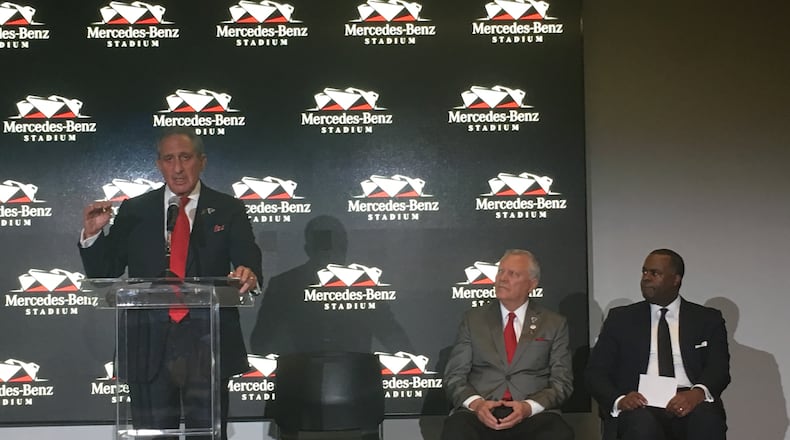The Republican governor, Democratic mayor and billionaire NFL team owner shared the stage – and shared plenty of credit – at Saturday's soft opening of the Mercedes-Benz Stadium. You could almost sense the relief.
“I’ll tell you, I sure am happy now. It’s certainly one of the happiest days I’ve been on this job,” said the aforementioned mayor, Kasim Reed. “Because the process to get today – it was pretty tough.”
When the Falcons first sought public support for the $1.5 billion facility, state lawmakers staunchly resisted pumping taxpayer dollars into the new stadium. And the public perception was souring - one AJC poll showed nearly three-quarters of voters were against using hotel/motel tax collections to finance the deal.
Around that time, five years ago, a partnership was solidifying. Gov. Nathan Deal and Reed already had a famous bipartisan friendship, and soon Falcons owner Arthur Blank was meeting regularly with the political leaders to hash out the plan.
State lawmakers agreed in 2010 to extend the city's hotel-motel tax for a stadium, setting the stage for the construction, but the $300 million public up-front contribution Blank sought was too high for many politicians. Deal pushed him in 2013 to reduce his ask to $200 million to make it an easier sell.
Reed, who was facing re-election, took a calculated risk. He became one of the most ardent supporters of the project, buttonholing city councilmembers and community advocates to lock down their support. Within weeks, the city council and Atlanta's economic development arm signed off on it.
The deal he struck was a costly one. Taxpayers are covering $200 million of the construction costs through bonds. The lodging tax will repay the bonds and hundreds of millions of additional hotel-motel tax revenue will go toward debt service and stadium maintenance – a figure that's likely to top $700 million.
In exchange, the Falcons and city officials promised immediate and continuing efforts to improve the struggling neighborhoods surrounding the sparkling new stadium. Summing it up on Saturday, Reed repeated a favorite line: "The juice was worth the squeeze."
As season-ticket holders wandered the stadium for the first time Saturday, a celebratory Blank took a look back at their political partnership. He called Deal the “father” of the stadium and said his counsel on selling the idea was sage.
“Every time I got that wisdom,” Blank said, “it turned out to be a yellow brick road to success.”
And Blank thanked the mayor for his “unflinching” support for the project, adding that the mayor early on saw an opportunity to help a blighted neighborhood.
“Great leaders intuitively know the right thing to do,” said Blank.
It was one of the crowning achievements for the Reed-Deal alliance, and one of the last times the two will likely share a podium together as public officials. Reed’s second term as mayor ends in January, Deal’s second term as governor expires the year after that.
The governor pondered a question about what helped forge their alliance for a minute before barreling down to the core of their friendship:
“Great things can be achieved when several things are set aside: One is, who is going to get credit for it. And secondly, whether a political point of view is going to be enhanced or not. We set aside those two points from the beginning.”
After the event, Reed was asked about the mounting criticism he faced – and still faces – for his role in the stadium deal.
“I took a lot of hits, but you know what? I’m just fine,” said Reed. “In Atlanta, it’s about the partner. You’ve got to believe the partners are worth going through the process with. And I never doubted that.”
About the Author
The Latest
Featured




